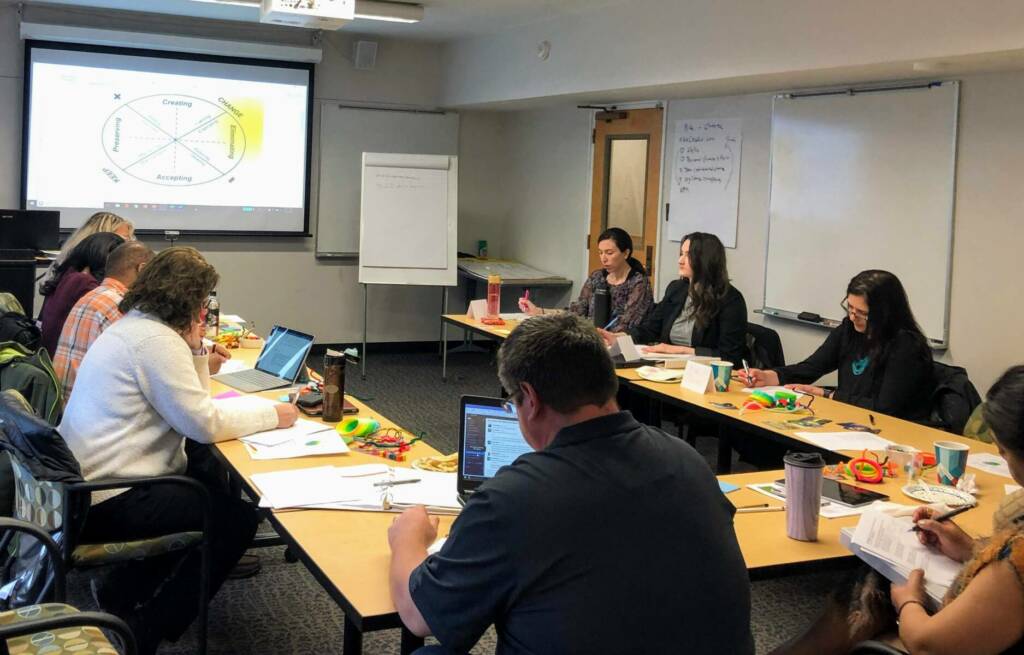
Change is inevitable, and organizations must adapt to remain relevant and competitive. Change management and organization development are widely used approaches to help organizations navigate change. Both approaches aim to achieve organizational objectives but differ in scope, methodology, and focus.
We will explore the differences and similarities between change management and organization development, their appropriate use within organizations, and the popular frameworks associated with each approach.
Change Management or Organization Development: What’s the Difference?
Change management is the structured approach to transition individuals, teams, and organizations from a current state to a desired future state. Change management focuses on implementing a specific change, such as introducing a new system or process and ensuring that stakeholders embrace the change. Popular change management frameworks include the ADKAR model by Prosci and the Lewin Change Model.
On the other hand, organization development is a long-term and systemic approach to improving an organization’s effectiveness and achieving its goals. It focuses on an organization’s human and cultural aspects and aims to bring about sustainable change. Modern organization development theories and methods include appreciative inquiry, action research, and future search.
Areas of Difference
- Focus: Change management focuses on implementing a specific change, whereas organization development focuses on improving the organization’s overall effectiveness.
- Scope: Change management is a narrow, short-term approach to addressing a specific issue, while organization development is a broader, long-term approach to improving organizational effectiveness.
- Methodology: Change management uses a structured approach to manage a specific change, while organization development uses a participatory approach to improve the organization’s overall effectiveness.
- Time Span: Change management has a shorter time span, typically months, whereas organization development is a continuous and long-term process that can take years.
- Stakeholders: Change management focuses on the stakeholders affected by a specific change, while organization development involves all stakeholders.
- Outcome: The outcome of change management is a successful implementation of a specific change, whereas the outcome of organization development is an overall improvement in organizational effectiveness.
- Initiator: Change management is usually initiated by external forces, such as a new regulation or market disruption, while organization development is initiated internally, often by management, who recognize the need for change.
Areas of Similarity
- People focus: Both change management and organization development involve people in the change process.
- Systemic approach: Both approaches take a systemic approach to change, recognizing that changes in one area of the organization can affect other areas.
- Continuous improvement: Both approaches focus on continuous improvement, recognizing that change is ongoing.
Appropriate Use Within Organizations
- Change management is appropriate for organizations that need to implement specific changes, such as a new system, process, or strategy.
- Organization development is appropriate for organizations that want to improve overall effectiveness, develop a positive culture, and achieve long-term goals.
- Change management can be part of organization development to address specific issues or implement changes that support the overall organizational strategy.
Frameworks Associated with Change Management
- ADKAR Model: The ADKAR model by Prosci is a structured approach to change management that focuses on five key elements: Awareness, Desire, Knowledge, Ability, and Reinforcement.
- Lewin Change Model: The Lewin Change Model is a three-stage model that involves unfreezing the current state, making the change, and refreezing the new state.
Frameworks Associated with Organization Development
- Appreciative Inquiry: Appreciative Inquiry is a participatory approach to organization development that focuses on identifying and building on an organization’s strengths and positive attributes.
- Action Research: Action Research is a collaborative approach to problem-solving that involves researching, planning, taking action, and reflecting on the outcomes to improve a particular situation or process.
- Future Search: Future Search is a participatory approach to organization development involving all stakeholders to create a shared vision for the future.
- Open Space Technology: Open Space Technology is a participatory approach to organization development that allows participants to create and prioritize the agenda and encourages open discussion and collaboration.
Change management and organization development are two distinct approaches that organizations can use to achieve different objectives. Change management focuses on implementing a specific change, while organization development aims to improve the organization’s overall effectiveness. While both approaches have similarities, such as a people focus, systemic approach, and continuous improvement, their methodology, scope, and time horizon differ. Organizations should carefully consider their goals and needs to determine the appropriate approach.
As experienced practitioners, it’s essential to thoroughly understand change management and organization development and the appropriate use of each approach. Familiarizing yourself with popular frameworks and theories associated with each approach, such as the ADKAR model, Lewin Change Model, Appreciative Inquiry, and Future Search, can help you successfully navigate change and drive organizational effectiveness.

